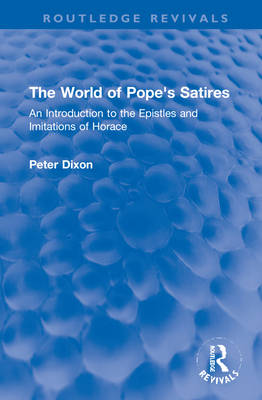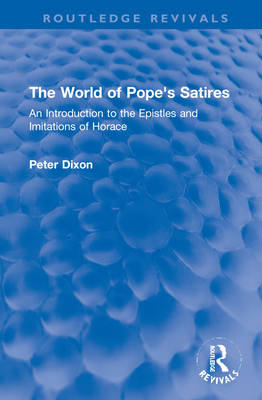
- Retrait gratuit dans votre magasin Club
- 7.000.000 titres dans notre catalogue
- Payer en toute sécurité
- Toujours un magasin près de chez vous
- Retrait gratuit dans votre magasin Club
- 7.000.0000 titres dans notre catalogue
- Payer en toute sécurité
- Toujours un magasin près de chez vous
Description
First published in 1968, The World of Pope's Satires is a stimulating and challenging book showing how the satires written by Pope during the 1730s were not only expressions of his own .poetic personality but were also responsive to the habits and attitudes of the age. The author considers Pope's uses of some current conversational technique (especially that of 'raillery') and of the closely related social ideal of the cultivated gentleman. Pope's regard for certain personal attributes and moral values - notably hospitality, integrity, friendship, charity and self-knowledge - is examined in two ways; as it expresses itself positively in the satires, and as it is defined negatively by his antipathy towards courtly self-seeking and hypocrisy, contemporary manifestations of acquisitiveness, and the pride associated with neo-stoicism.
The final chapter is wide ranging and shows that although Pope is at times representative, and therefore limited, in his response to the pressures and uncertainties of the age, his satires live because of the subtlety of his treatment of such Augustan commonplaces as Order and Balance and the passion and spirit of his writing. This will be an interesting read for students of English literature.
Spécifications
Parties prenantes
- Auteur(s) :
- Editeur:
Contenu
- Nombre de pages :
- 232
- Langue:
- Anglais
- Collection :
Caractéristiques
- EAN:
- 9781032195155
- Date de parution :
- 30-01-22
- Format:
- Livre relié
- Format numérique:
- Genaaid
- Dimensions :
- 156 mm x 233 mm
- Poids :
- 452 g

Les avis
Nous publions uniquement les avis qui respectent les conditions requises. Consultez nos conditions pour les avis.






